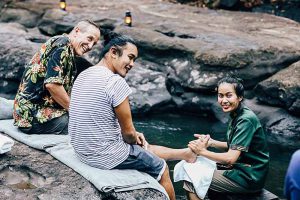
Landscape architect, architect, and designer Bill Bensley on designing for wellness, sustainability, the importance of incorporating nature, and much more.
Bill Bensley is a landscape architect, architect, and designer, renowned and sought after in the hospitality world for astonishing, creative, and whimsical designs of luxury hotels, resorts, and spas.
At his Ateliers in Bangkok and Bali, simply called BENSLEY, Bill employs a team of 150 interior designers, architects, landscape designers, artists, and “makers of all things beautiful.” They have created spaces for more than 200 resorts, hotels and palaces in nearly 40 countries. These include designs for Four Seasons, Rosewood, Marriott, and many more, plus Bensley Collection’s own Shinta Mani Pool Villas Siem Reap and Shinta Mani Wild, in Cambodia.
Shinta Mani Wild is an all-inclusive luxury tented camp, described by Bill as “a utopia of sustainability”. It is located deep in the South Cardamom National Forest on land Bill purchased with his business partner Sokoun Chanpreda to save it from poaching and logging. Upon arrival, guests zipline 400m over the forest canopy, a river and waterfalls into the “Landing Zone Bar”. The camp experience offers a variety of activities to push people beyond their boundaries and explore the natural environment. The design of 15 onsite tents is inspired by King Sihanouk and Jackie Kennedy’s 1967 Cambodian travels.
Sustainability is one element Bill integrates into all of his designs, in his hopes of being part of a wave on which the hospitality industry bands together to help reverse climate change. His open-source white paper “Sensible Sustainable Solutions” was launched in January 2020 and is available here on his website.
Another important element for Bill is having fun. In 2017, when he was inducted into the Hospitality Designs Hall of Fame, he told CNN, “If it’s no fun, don’t do it. If you’re not having fun, then you’re not going to do a good job. Everybody in our studio here … we’re all about having fun.”
We spoke to Bill Bensley about designing for wellness, sustainability, the importance of incorporating nature, and much more.
Can you please talk a bit about your career trajectory and what drew you to architecture and design?
It actually started with career day at school. We had to call people and ask them to come speak – I accidentally dialed the wrong number in the phone book (I was aiming for the fire department) and ended up speaking to a man called Rocco, who was a landscape architect. He visited my high school with a spectacular slide show of his work at Knotts Berry Farm – a nearby amusement park, like a western Disneyland, that I had been visiting for years. The idea of getting to design a place that brings so much fun and joy to thousands of people on a daily basis was the lightbulb moment. I knew I had to be a landscape architect. Rocco and I are still in touch and I often thank him, all this time later. After college at Harvard, by way of scholarships, I came to Asia and cut my teeth building many exotic gardens, mostly in Bali, but honestly, I did not like most of the hotel buildings I was asked to tart up with my tamed jungles. After some time in Singapore and Hong Kong I came to Bangkok and set up shop in 1989… and here we are! I never thought I would one day be at the top of my game in South East Asia, as a landscape architect and hotel designer by the time I was 60.
Your designs are breathtaking. Can you share some of the factors you consider when designing hospitality spaces?

Why thank you! Good design, at least in my playbook, rarely fails when it follows the 3 Es: it should EDUCATE visitors and teach them something new, champion the ENVIRONMENT, and provide a unique EXPERIENCE… ticking those boxes, one rarely goes wrong.
Take Shinta Mani Wild. The lesson there was teaching the world that conservation is a viable alternative to extraction, building a tented camp in a preserved forest – without cutting down any trees – and using it as a means to fund protection from poachers and loggers by the Wildlife Alliance NGO. It is packed with experiences, from following the rangers on patrol to arriving at the lobby by way of a leap of faith off a seven-story tower and flying along a 400 meter zipline through the forest and over a waterfall, and being handed a G&T on landing. One, I think, will have bragging rights for the rest of their life? I want guests to be able to feel the pride and joy that I feel in being involved on the real honest to God front line of protecting the Cardamom National Park, while also being comfortable enough to be able to fully enjoy the beauty of this true wilderness. I have learnt through a lifetime of exploring wilderness areas in 50+ countries, that if one has to be fully occupied with survival or just making oneself comfortable, the beauty of a place becomes foggy.
How does design impact the guest experience?
It is everything, if you ask me! There are hotel chains which consider nondescript, soulless blank box rooms that look identical in every city, all over the world, good enough. But why do that when you can do something completely wonderful? Good design should be unique to where you are, an education in itself on the new culture you are immersing yourself in. One example is Capella Ubud. We started off as the landscapers on the project, and the plan architecturally was a huge hulk of a hotel that would have obliterated the natural beauty of the site, which is a valley sacred to the Balinese. Being a lover of nature and a landscape architect by training, I persuaded our good client, Suwito, to hire us to do the whole thing, and swap the boring 120 room hotel for a 24-tent camp. Capella Ubud tip toes ever so softly on the land, without cutting down a single tree, and working with a more luxurious hotel operator allowed us to raise the room rate, which is now the highest on the island. Capella Ubud was rated #1 in the world by Travel and Leisure. I am very proud of that!
Are there factors you consider specifically when designing spas and wellness spaces? What makes a space healing and restful?
The single most important element of a spa is that the relationship to mother nature is paramount. The guest should have the option of being outside while having perfect privacy. There is little more soothing than a massage to the sound of nature’s creatures at sunset – as I write this I am actually having a foot massage in my garden! Although I am a maximalist, I do think keeping it simple in the spa cannot go amiss. Also going local – forget the fancy French imported products, and learn from the locals – they know best!
Can you talk about the importance of conservation and sustainability and why this matters to you? Why do hospitality companies need to understand the importance of these things?
Conservation and sustainability should matter to all of us. Not putting nature on the top shelf has brought us to the brink of climate disaster. I was raised to care, being born in California to English immigrants who had a small farm. We were almost totally self-sustaining. I raised bees, quails, chickens, ducks, rabbits, mushrooms, a huge variety of veggies, and of course a compost heap. Every weekend we’d take the trailer to a camp spot, and in the summer we would travel all over the states… never leaving behind more than a footprint. We learnt respect for nature. It makes me smile to hear the word sustainability used so frequently these days as though it is a new idea! At the point we are at, the importance of caring for our planet cannot be underestimated, especially big players like large corporations and hospitality companies who cause the most impact. As individuals we all must do what we can, but are a drop in the ocean compared to the single-use plastic and energy-use monsters big hotels can be.
Are there design trends or developments you’re excited about?
Recycling! Upcycling! Trashion! These are no longer dirty words people turn their noses up at. Naturally, I am overjoyed. I have always wanted to build a hotel made of 100% recycled materials… How cool would that be? I think we are well on the way, as we are soon opening an InterContinental here in Thailand where the rooms are upcycled train carriages… we retrieved them from all over Thailand and have renovated them into 16 stunning suites, with bespoke interiors to fit the very particular dimensions. Some will even become a bar and a spa! Upcycling on a big scale is the future, and I am so glad InterContinental joined us on this adventure.
Can you talk about the death of luxury and how tourism will change going forward?
Journalists often ask me about that old quote “Luxury is dead.” It really struck a chord with people. Having gone through a world with COVID, I think many of us have felt that luxury is the freedom to travel, and to do so safely. Going forward, the emphasis will be on exclusive experiences limited to small groups of friends or loved ones, like buying out a small hotel or house and taking it over for a holiday, like I did this winter in Mexico. I also think people will prioritize longer travel, and making the most of those trips, rather than short jaunts, as that makes all the paperwork worth it!
What is your favorite project you have worked on?
You may as well ask me to choose my favorite child, as hotels are very much that! If I HAD to pick one, it would be Shinta Mani Wild, as it has everything I would want in a hotel. Wilderness, conservation, great design, storytelling, and not to mention, the best arrival ever… I do love a zipline and a stiff drink!
What are you working on now?
I am working on a fascinating new idea for regenerative living in Portugal with an old friend, the InterContinental Khao Yai that is coming ever so soon, projects in Zanzibar, Tel Aviv, The Congo and Nepal, and a gorgeous Spa in Mayfair bringing ancient Thai Escapism to London! The party doesn’t stop.
Spa Executive is published by Book4Time, the leader in guest management, revenue and mobile solutions for the most exclusive spas, hotels, and resorts around the globe. Learn more at book4time.com



